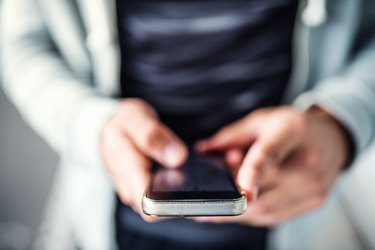
If your cellphone isn't getting the level of reception you want when you use data services, make calls or send texts, it may be that it has an outdated list of cell towers to connect to. Most carriers allow you to update the list of towers that your phone connects to automatically. If you're outside your home country, remember that you may pay extra to use your phone while roaming.
The Preferred Roaming List
Video of the Day
When your phone is attempting to find a signal, it consults an internal database called the preferred roaming list. The PRL tells the phone which radio frequencies to use and which towers to attempt to connect to.
Video of the Day
When you're on your own carrier's network, the PRL generally is configured to maximize your signal while avoiding overloading a particular tower or frequency band. When you're outside your carrier's network, it may also be set up to optimize the cost for your carrier or you, especially if you're outside your home country.
If you are traveling outside your home country, make sure you understand your carrier's roaming charges for calls, texts and data so you don't get hit with unexpected fees.
Updating Your PRL
Your phone may update your PRL periodically as new towers come online or old ones shut down and the network otherwise changes. Many carriers give you a number to call to update cell towers and other PRL information.
For example, you can get a Verizon or U.S. Cellular carrier update for cell towers on U.S. Cellular and Verizon phones by dialing 228 or on *Sprint** and Virgin Mobile USA phones by dialing ##873283#. If you're not sure of the number to call on your phone, contact your carrier to inquire.
In some cases, your phone may automatically download a new PRL when you restart it or when it exits airplane mode. Check the documentation for your phone or check with your carrier if you aren't sure this method works with your phone.
Smart Phone Apps to Update Towers
You can also use built-in or downloadable apps on a smart phone to update PRL and other carrier settings. On an iPhone, tap the Settings button on the home screen and then tap General and About. You will see an option to update your carrier settings if an update is available.
On an Android phone, tap the Settings button. Then, tap About Phone. If you see the Update Profile button, tap it. Otherwise, tap System Updates and then tap Update Profile. Wait until the update successfully installs.
Checking Local Signals
If you have trouble connecting to your carrier's signal at your home, workplace or somewhere else where you spend a lot of time, you may want to consider switching carriers. You want to pick a carrier that provides a good signal where you use your phone.
Carriers publish coverage maps, but they're not always detailed enough to see where you have a good signal on a local level. You can also use crowdsourced maps from services such as OpenSignal or use apps that enable you to test your coverage at a particular location.
Another option is to ask friends with different cellphone carriers to test their phones at your home to see if they get a stronger signal than you're getting or ask your neighbors which cellphone carriers they use and how satisfied they are with the level of service. If you buy a cellphone from a new carrier and aren't sure it will meet your needs at a particular location, make sure you understand the return policy so you can take it back and cancel the service if it proves to be inadequate.
- OpenSignal: Apps
- Verizon: Preferred Roaming List (PRL) FAQs
- Google Play: Antenna Pointer
- Google Play: Network Cell Info Lite - Mobile & WiFi Signal
- Wilson Amplifiers: Find Your Nearest Cell Tower in Five Minutes or Less: 2019 Edition
- Phone Scoop: PRL
- Apple: Update Your Carrier Settings on Your iPhone or iPad